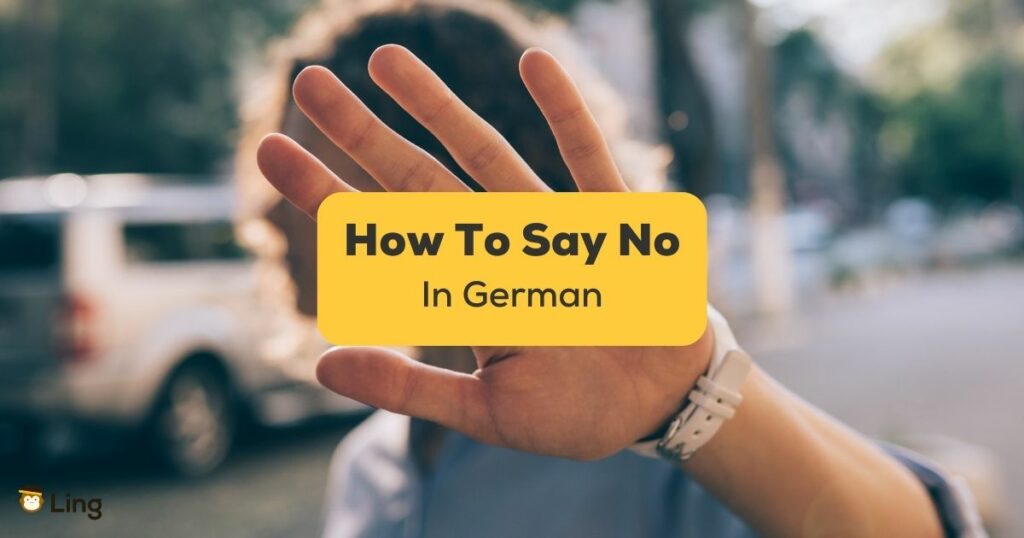Saying “no” can be difficult in any language, but it can be incredibly challenging when you’re not fluent in the language you’re trying to communicate in. Whether you’re a tourist in Hamburg or communicating with German-speaking colleagues or friends, it’s important to know how to respond with the basic nein or no in German.
In this article, we’ll cover everything you need to know to decline confidently in any situation. From basic vocabulary and pronunciation to cultural considerations and common expressions, we got you covered! Let’s begin!
Learning to say no during your travels is essential for ensuring that you have a safe and enjoyable experience. You see, this simple word can help you avoid potentially dangerous situations, unwanted attention, and scams, allowing you to focus on the positive aspects of your trip.
During my trip to Germany, I used the power of “no” when a stranger approached me on the street and asked if I wanted to go to a bar with him. Although he seemed friendly enough, I didn’t feel comfortable going with someone I had just met, especially since I was traveling alone. I politely declined his invitation and continued on my way, feeling confident in my ability to set boundaries and prioritize my own safety.
From that point forward, I realized one thing: being able to communicate in the local language can make a huge difference! Although many Germans speak English, I found that speaking even basic German phrases empowered me to navigate the country independently and connect more deeply with the locals. Plus, I found that Germans were generally more receptive and friendly when I made an effort to speak German, even if it was just a simple response to a yes or no question or showing thanks with a danke.
So to help you out, I rounded up in this post all the best and easiest conversational phrases and German words for saying no. This post is perfect for English speakers who are totally new to this language, as we’ll also touch on some grammatical and cultural aspects as well. If you’re ready for that and more, then keep reading below!

How Do You Say No In German?
The most straightforward way to say “no” in German is the word “Nein.” To make this sound more effective, it’s important to use a firm but polite tone of voice and to be aware of nonverbal cues such as shaking your head to convey a negative response. Depending on the situation, you may also expand your response to sound more natural and comfortable at the moment.
Question 1: Do you have the keys? = Hast du die Schlüssel?
- No = Nein.
- No, I don’t have the keys = Nein, ich habe die Schlüssel nicht.
As you can see from the example above, responding with the German word “nein” is acceptable, but it doesn’t sound as polite or friendly as we’d like, right? In this case, you can offer an expanded response by using “nicht” after the verb and placing it at the end of the sentence. We use this word whenever we negate verbs, nouns, adjectives, and adverbs. However, do note that you can also use the word “kein” in forming responses, as it can literally be translated to “not” or “no.”
Question 2: Do you have money? = Hast Du Geld?
- No = Nein.
- I have no money = Ich habe kein Geld.
Sounds pretty easy, right? Now if you truly want to sound more polite, you can also start with a phrase like “Tut mir leid,” which means I’m sorry, or with “Nun” and “Naja,” which are somewhat the same with well in English.

Words To Say No In German
Looking to politely decline something in German beyond the classic “nein”? You’re in luck! In this section, we’ll cover the basics so that you can quickly and easily memorize these phrases and confidently use them in your daily conversations.
| English | German | Context |
| No | Nee | Colloquial |
| No | Nö | Used in books and in everyday speech. Be careful, though, as it comes off as a bit rude. |
| No | Nich | Used specifically in the Berlin dialect as a contraction for nicht. |
| Maybe | Jein | Used in daily conversations and combines ja and nein. |
| Unfortunately, no | Leider nicht/nein | Used to sound more polite as it literally translates to “Unfortunately, no” in English. |
Important German Phrases For Saying No
When you visit Germany, it’s not just the words that you need to focus on! If you want to communicate effectively, learning conversational phrases that’ll help you get by in everyday situations is just as important. In this section, we rounded up other ways to say no that can be used in multiple real-world conversations.
| English | German |
| Absolutely not | Auf gar keinen Fall |
| Not at all | Überhaupt nicht |
| Definitely not | Absolut nicht |
| I don’t think so | Ich glaube nicht |
| I’d rather not go | Ich gehe lieber nicht |
| I’ll pass | Ich verzichte/Ich passe |
| I’m not interested | Ich habe kein Interesse |
| Maybe another time | Vielleicht ein anderes Mal |
| No way | Nie und nimmer |
| No, I don’t want to. | Nein, ich will nicht. |
| No, thank you | Nein, danke |
| Not at all | Gar nicht |
| Not right now | Nicht jetzt |
| Sorry, I can’t | Es tut mir leid, ich kann nicht |
| That doesn’t work for me | Das passt mir nicht |
| … is absolutely forbidden in my car. | … ist in meinem Auto absolut verboten |
| That’s not allowed here | Das ist hier nicht erlaubt |
| Unfortunately, I have to decline | Ich muss leider ablehnen |

Practice Conversations In German
Ready to say no like a boss in German? We’ve got you covered with some real-life situations and awesome ways to shut them down politely.
| Scenario | English | German |
| Someone asks you to do a favor, but you don’t owe them anything. | No, thanks. I’m tired and want to sleep. | Nein, danke. Ich bin müde und möchte schlafen. |
| Someone offers you a cigarette, but you don’t smoke. | No, thanks. I don’t smoke. | Nein, danke. Ich rauche nicht. |
| Someone invites you to a party, but you have other plans. | No, thanks. I already have something to do. | Nein, danke. Ich habe schon etwas vor. |
| Someone asks you to lend them money, but you don’t want to. | No, I’m sorry. I can’t lend you money. | Nein, tut mir leid. Ich kann dir kein Geld leihen. |
| Someone tries to sell you something, but you’re not interested. | No, thanks. I don’t need that. | Nein, danke. Ich brauche das nicht. |
| Someone asks you to join a club, but you’re not into it. | No, thanks. That’s not my thing. | Nein, danke. Das ist nicht mein Ding. |
| Someone asks you to help them with a project, but you’re busy. | No, I’m sorry. I don’t have time. | Nein, tut mir leid. Ich habe keine Zeit. |
| Someone asks you to watch their kids, but you don’t like children. | No, thanks. I don’t like children. | Nein, danke. Ich mag keine Kinder. |
| Someone asks you to go on a date, but you’re not attracted to them. | No, thanks. You’re not my type. | Nein, danke. Du bist nicht mein Typ. |
| Someone asks you to sign a petition, but you disagree with it. | No, thanks. I’m against it. | Nein, danke. Ich bin dagegen. |
| Someone asks you to donate to a charity, but you don’t have money. | No, I’m sorry. I don’t have any money left. | Nein, tut mir leid. Ich habe kein Geld übrig. |
| Someone asks you to share your food, but you’re hungry. | No, thanks. I’m hungry and want to eat everything. | Nein, danke. Ich habe Hunger und will alles essen. |
| Someone asks you to do a favor but you don’t owe them anything. | No, I’m sorry. I don’t owe you anything. | Nein, tut mir leid. Ich bin dir nichts schuldig. |
Cultural Considerations In The German Language
While the basics of saying no in German are fairly straightforward, there are some cultural considerations to keep in mind. Germans tend to value directness and honesty, so it’s important to be clear and concise when declining something.
At the same time, Germans also value politeness and respect, so it’s important to use polite language when declining. This means using phrases like “leider nein” (unfortunately no) or “ich muss passen” (I have to pass) instead of simply saying “nein” (no). However, the locals said that it’s totally acceptable to say “nein” when speaking with total strangers.
It’s also worth noting that Germans tend to be punctual and value efficiency. If you need to decline an invitation or request, do so as soon as possible so the other person can make alternative plans.
Start Learning German Words And Phrases Today!
Looking for the best apps to learn German?
If you want to give German or any of the 60+ other languages a try, then you should definitely give Ling a try. The Ling app is a fun and effective way to master a new language, with engaging games, in-depth interactive lessons, and real-life scenarios. The best part? You can learn German or any language at your own pace, track your progress, and chat with a dedicated chatbot, all within the app! That’s why whether you want to travel, work, or study abroad, the Ling app will help you achieve your language goals.
Ready to learn now? Download the Ling app from the Play Store or App Store and start your language-learning journey the right way!


































































